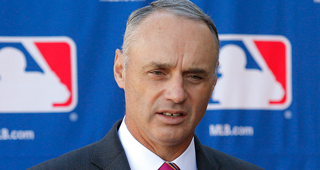Rob Manfred says he "reject[s] the premise" that minor league players are not paid a living wage, prompting criticism a day after the Senate Judiciary Committee inquired about the league's treatment of minor leaguers.
When asked whether owners can't afford to pay minor leaguers more or simply choose not to, the commissioner said: "I kind of reject the premise of the question that minor league players are not paid a living wage. We've made real strides in the last few years in terms of what minor league players are paid, even putting to one side the signing bonuses that many of them have already received. They receive housing, which obviously is another form of compensation. I just reject the premise of the question. I don't know what else to say about that."
Minor league salaries have increased in recent seasons and teams this year for the first time are mandated to provide housing, but the majority of minor league players' salaries are under the poverty line.
Players not on the 40-man roster or with major league experience receive between $4,800 and $14,700 annually and are paid only in-season.
"Most minor league baseball players work second jobs because their annual salaries are insufficient to make ends meet," said Harry Marino, the executive director of Advocates for Minor Leaguers. "The commissioner makes an annual salary of $17.5 million. His suggestion that minor league pay is acceptable is both callous and false."
Earlier this week, MLB settled for $185 million a class-action lawsuit by minor leaguers who alleged minimum-wage and overtime violations by teams. The settlement, which covers more than 20,000 players, will distribute more than $120 million across the group and calls for MLB to allow teams to pay minor league players during spring training, extended spring training and in instructional leagues.


